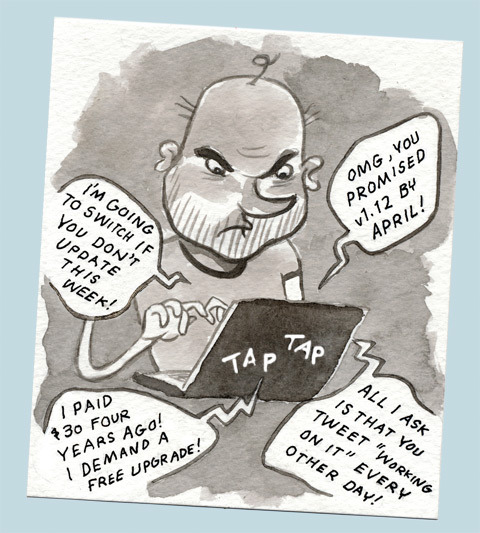The Age of Entitlement or Why Hasn't the Hammer Been Updated? It's been 32,000 years already!

Developers must be seriously ambivalent about their users now being able to purchase and update software over the web. Gone are the days when you sweated a bug-free shipping release that was pressed to a permanent medium, boxed up and set out on shelves. Release early and release often is the new chant of the user, especially the latter part. That and “I can’t live without the auto-syncing iPhone companion app!”
Users are also often demanding that the programmers join the social web revolution, broadcasting their progress in regular blog or twitter updates. A month of silence is inexcusable, 3 months is justification to jump ship, 6 months is proof of vaporware, and anything beyond that is a dire personal insult to each and every user hungry for features that “every other competitor already has.”
Two of my favorite programs on OS X, TextMate and The Hit List, seem to attract the loudest of these users. And yet, they’re both amazingly functional, almost perfectly so, in their current releases. Granted, the Hit List folks are mostly angry about the iPhone version that’s apparently been in private beta for some time, but there are also a number of users vocally upset that the dev is focusing elsewhere instead of posting further updates to the desktop version.
“Software is just a tool to make our life or job easier but nothing is irreplaceable.” - from The Hit List User Group
Many users have given up waiting for The Hit List iPhone app and jumped ship to Things, which had its own similar fiasco, yet in reverse – users were up in arms when Cultured Code chose to focus on releasing their iPhone companion app before their desktop version was usably out of beta. To add insult to impudence, the original iPhone version was just as buggy when it finally came out. User revolt got so out of hand they completely wiped out their forum, after initially hiding it from their navigation.
Another promising program that has developers who are quiet on the web and slow in their updates, with an accompanying torch-wielding mob of angry users, is MacRabbit’s Espresso. I picked up The Hit List and Espresso in the last MacHeist bundle for a piddly $35, so I feel like I have no right to complain, but I’m seemingly alone with that opinion. I agree to the extent that Espresso was obviously rushed to v1.0 for MacHeist, and although it definitely holds a lot of promise, it does have deceiving claims on their feature list: live preview does not work on anything but locally hosted pages for one. MacRabbit similarly hid their forums from their main site navigation, but it still exists.
TextMate Nuke ‘Em v2.0
It’s been almost three years since Allan Odgaard warned TextMate users to “put TM 2.0 up there with Duke Nukem Forever and be positively surprised the day it is released.” Yet, folks to this day post rudely passive aggressive comments on any little post he manages to eke out on the Macromates Blog. You’d think they’d have given up by now.
The improvements I’d love to see in a new TextMate are hinted at in Espresso, but far from being realized. Primarily I’d enjoy a more seamless way to edit CSS, perhaps elements of FireBug hooked into the editor, allowing you to dive right into specific style rules, or lines in a javascript file. I can’t quite picture how this would work, but it would definitely simplify my jumping from TextMate (code) to Firefox/FireBug (live debugging) to ForkLift (SFTP) to Terminal (svn) and back for every little change. Some might recommend Coda and/or CSSEdit (which I have a license for), but neither worked well for me. If nothing else, removing TextMate from my workflow just wasn’t worth it.
Despite these desires to see future updates, I have a perfectly functional set of software that I trialed before purchasing. I don’t feel the developer owes me anything but essential bug fixes. Beyond that, I consider any updates a gift, and they should feel free to get the hell off the computer, travel around and booze it up, spending whatever scratch they managed to squeeze out of the competitive software market.
